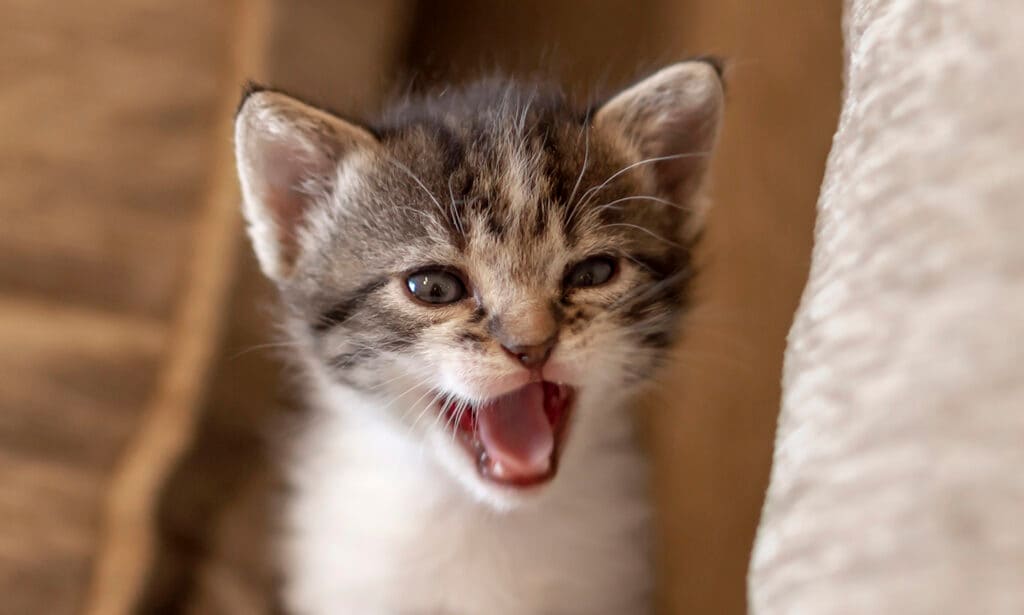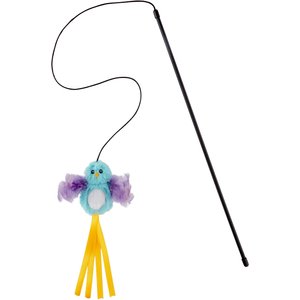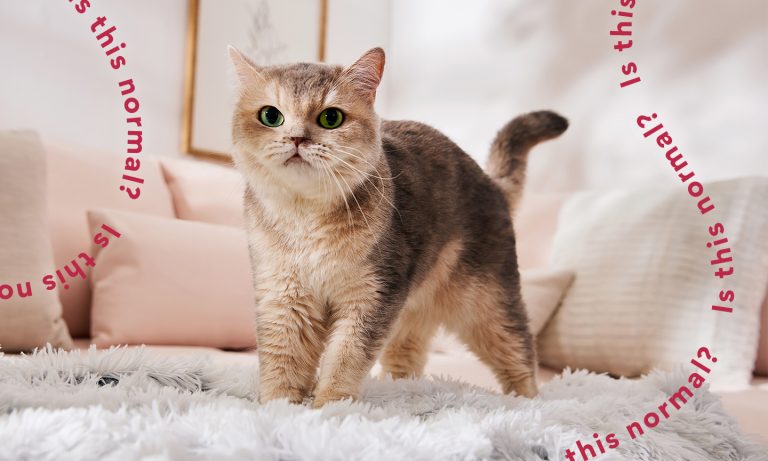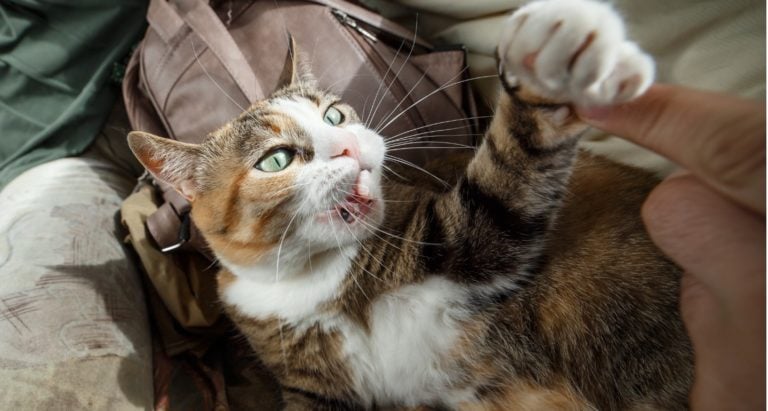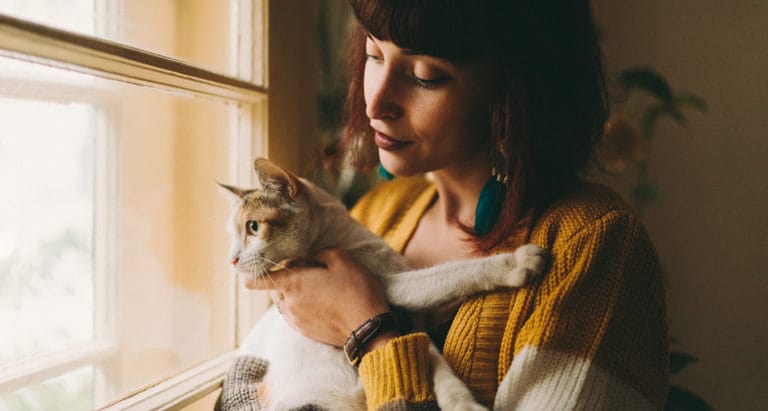When your cat starts making those pitiful, sad-sort-of meowing sounds, your instinct is to wonder whether they’re crying. But can cats cry, truly?
We spoke with veterinarians and an animal behavior consultant to get to the bottom of this topic, asking about everything from whether cats can cry, and what cat crying may sound and look like, to how these sweet creatures communicate with us. We’re also discussing some common reasons why you may see cat eyes watering, which we’ll say up front is usually a sign of something physical going on versus emotional.
In This Guide:
Can Cats Cry Tears?
While cats can make sounds that are akin to crying, they don’t cry in the same way humans do. Humans cry due to complex emotions; as a result, we produce tears.
“While cats can cry due to stress, pain, loneliness, or for attention, they do not produce tears in the traditional sense and do not have complex emotions like people do,” explains Carly Fox, DVM, senior veterinarian in the Emergency & Critical Care Department at Animal Medical Center in New York City.
How Do Cats Cry?
Cat crying varies depending on the individual cat (including their age, breed, and personality) and what they’re crying about (more on that in a second).
However, most cat cries sound like yowls, loud meows, or in some cases a faint whimpering.
“Occasionally, cats can whine or chatter when they’re upset, but usually they make a very loud, mournful sound if they’re in particular distress,” Dr. Fox says.
Why Do Cats Cry? 7 Reasons for Cat Crying
Cats cry for a few reasons, but usually their No. 1 goal is to get your attention.
Here are some common reasons cats cry, according to Dr. Fox and Amy Shojai, CABC, a certified animal behavior consultant for cats and dogs based in north Texas.
1. Your Cat Wants Food
Cats develop internal clocks and know exactly when mealtime rolls around. Meow-demands come fast and furious when the bowl empties and tummies rumble.
Get your cat on a schedule and try not to vary times—or your cat will try to turn you into a treat machine. Getting an automatic pet feeder can help you stick to a consistent mealtime routine.
2. Your Cat Wants Out
Cats are seemingly always on the wrong side of the door—they’re either trapped inside with you or without you and want out! They often use meow-demands to get humans to play doorman, Shojai says.
If you’ve ever gone to the bathroom, or tried to close your bedroom door at night, and heard your cat meowing on the other side, this is likely the reason for their cries.
Install a pet door to provide access to cat-safe rooms or catios.
3. Your Cat Wants Attention
Cats are quite social with people they love and can easily grow bored. When paw-pats fail, cats may resort to crying to get petting and playtime.
Be sure to reciprocate and offer attention and play time on a schedule, as ignoring feline overtures will get you snubbed later when you want to interact. You can bond with your cat by playing with them, whether its chasing a wand toy or tossing a catnip-filled plush for them.
4. Your Cat Is Annoyed with You
Forcing a cat to do anything they dislike may prompt caterwauling. For example, cats often meow for release when held too long for their liking, Shojai says.
Watch body language, and stop what you’re doing before the ears turn sideways and the tail thumps a warning—or meows could turn to bites.
5. Your Cat Is Scared
A frightened cat may start out with protest meows, but those meows could turn into growls and hisses. A truly frightened cat, however, hides and falls silent, not wanting to draw attention to himself.
Figure out what’s scary and help relieve kitty angst. Pheromone products like the Feliway® plug-in may help; talk to your vet.
6. Your Cat Doesn’t Feel Well
Sick cats try to hide illness, but there are exceptions. Some cry prior to vomiting or coughing up a hairball. And hypertension, cognitive issues of aging cats, and deaf cats often meow a great deal from discomfort, confusion, or anxiety.
Any time meows increase from the norm, consider a veterinary checkup.
7. Your Cat Is Simply Chatty
Some breeds—including Siamese, Bengal, Tonkinese, and Sphynx—talk a great deal.
Talking back to these cats encourages the behavior, so proceed however you prefer!
Why Are My Cat's Eyes Watering?
Also called epiphora, watery cat eyes are typically a physical issue—not crying or sadness.
“Watery eyes are seen in cats with a variety of ocular conditions, such as viral or bacterial infection, allergic conjunctivitis, and corneal disease,” Dr. Fox says.
If your cat’s eyes are watery, red, or if they are squinting, have them evaluated by a veterinarian.
Your vet will assess your sweet kitty, make a diagnosis, then prescribe a treatment plan to help with watering cat eyes. This may include medications, such as eye ointments or antibiotics, or a longer-term health plan to help them find much-needed relief.
When To See the Vet About Watery Cat Eyes
If the watery eyes are new, you should see your vet if it:
- Lasts more than 24 hours
- Is affecting typical daily behaviors (eating, drinking, playing, using the litter box)
- Is accompanied by discharge or pus
If you see any sort of injury, such as laceration around or in the eye, it’s important to see the vet right away, as well, says Jennifer Donaldson, DVM, a veterinarian based in Willow, Alaska.
“Cats can be rather stealthy and creative in hiding symptoms of discomfort or illness, so owners should be advised that if the cat is rubbing or pawing at the eyes, holding one or both closed, or if there is cloudy discharge to seek veterinary care as soon as possible,” Dr. Donaldson says.
It’s also important not to use human eye solutions or drops unless directed by a veterinarian, Dr. Donaldson adds.
If your cat’s eyes are watering for only a few minutes and it resolves—and there’s no sign of injury to the eye or the surrounding area—you probably don’t need to go to the vet. Still, it’s a good idea to monitor them for the next 24–48 hours to make sure the watering eyes are completely resolved.
Short-faced cat breeds may be more prone to excessive tear production, leading to regular occurrence, Dr. Donaldson says. In this case, follow your vet’s advice about routine daily care.
FAQs About Cat Crying
Q:Can cats cry tears when sad?
A:No, cats do not cry tears like humans do. If their eyes are watering, it’s typically a sign of a physical issue, such as irritation, injury, infection, or a chronic condition. See your vet if the issue persists more than 24 hours.
Q:Do cats cry when sad?
A:Possibly; there’s still a lot we don’t know. Dr. Fox says that cats experience a wide range of emotions, including fear, happiness, curiosity, and contentment. “Research also shows that different sounds that cats make correspond to their emotional state,” she says.
Q:Do cats cry in pain?
A:Cats can vocalize due to hunger, pain, stress, attention seeking, or mating behavior. It’s also possible for cats to have a primary neurologic problem that causes them to vocalize as well.
Share:
